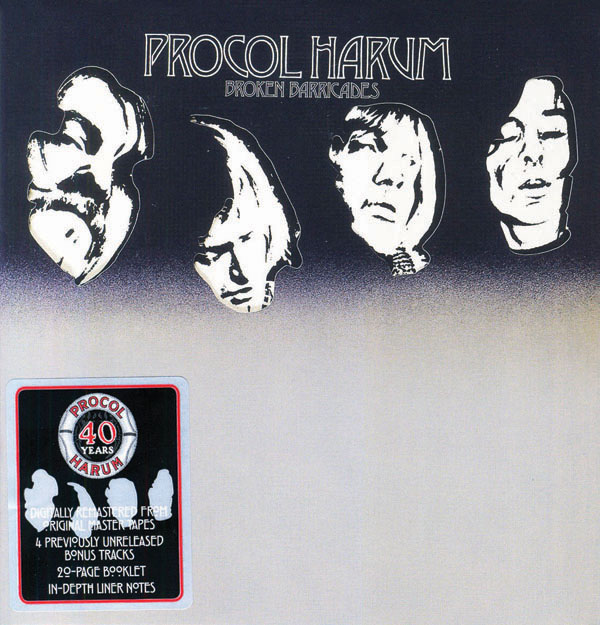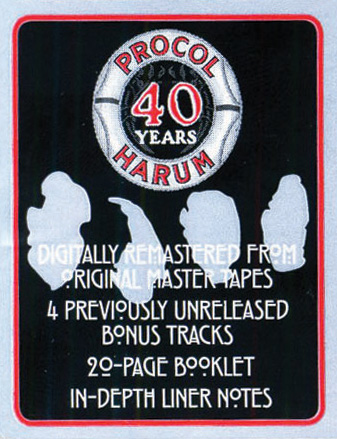Brokern Barricades • liner note
The Salvo reissue, 2009 • Salvo CD022
When it was released midway through 1971, Broken
Barricades found itself up against stiff competition. The ‘pop’ music of the
previous decade had already metamorphosed into ‘rock’ – but even that genre was
now diversifying.
There was a widespread fondness for what we now know as
Americana, exemplified by albums from The Band, Ry Cooder and Elton John. And
singer-songwriters were also leading from the front, with James Taylor, Carole
King and Cat Stevens all releasing best-selling albums.
In the wake of The Beatles’ Sgt Pepper, it was
generally accepted that The Who’s 1969 rock opera Tommy had opened the
floodgates of possibility – but then, as Pete Townshend himself later admitted,
Tommy had only been made possible by Procol Harum’s pioneering In Held
‘Twas In I from 1968’s Shine on Brightly. But whoever started it, by
the beginning of the ’70s every rock band of merit felt the need to express
themselves over two, or four, sides of vinyl.
 Procol
Harum’s fifth album, Broken Barricades, was released the same year as
albums from Yes, Pink Floyd, Caravan, Jethro Tull, ELP, the Moody Blues and Led
Zeppelin, all fired with ambition to explore the possibilities offered by rock &
roll. But despite the stiff competition, with Broken Barricades, Procol
were, as ever, in the vanguard.
Procol
Harum’s fifth album, Broken Barricades, was released the same year as
albums from Yes, Pink Floyd, Caravan, Jethro Tull, ELP, the Moody Blues and Led
Zeppelin, all fired with ambition to explore the possibilities offered by rock &
roll. But despite the stiff competition, with Broken Barricades, Procol
were, as ever, in the vanguard.
At a time when the only effective way for a band to alert
audiences to their new work was by gigging, Procol necessarily squeezed in the
recording of Broken Barricades between live performances. Returning from
an exhaustive American tour, Procol staked their tent at AIR Studios on Oxford
Street. Following the very public break-up of The Beatles – who were still
limping through the law courts – George Martin had established AIR in the heart
of London, as his own state of-the-art studio.
Following his work on Procol’s fourth album, Home,
which had marked a rockier, harder-edged direction for the band, producer Chris
Thomas was back behind the board. The recording of the new album was spread over
three dozen sessions during February and March of 1971 – and the end result was
Broken Barricades. Prior to that, Procol Harum albums had been
characterised by at least one song that could best be described as ‘epic’ -
In Held ‘Twas In I, A Salty Dog, Whaling Stories ... But
Broken Barricades was a back to basics album, in which the musicians
reverted to the sort of musical muscle they had employed in pre-Procol days.
For a start, the album featured eight tracks over two
sides; and Broken Barricades was also notable for the relative absence of
that hallmark Procol organ. After sharing a bill with The Doors in California in
1967, Procol had decided to emulate The Band’s Ray Manzarek, who employed a
special keyboard, enabling him to double up on bass and organ. But with the
limited employment of organ on Broken Barricades (Power Failure
being a conspicuous exception), Procol’s multi-instrumentalist Chris Copping
took the opportunity to concentrate on the bass guitar.
A further infusion of instrumental variety on Broken
Barricades came when Chris Thomas ‘sneaked in’ a Moog synthesiser. Procol
were, once again, ahead of the pack. The album was also notable for offering
guitarist Robin Trower more of an opportunity to shine: of the eight tracks on
the album, three were Trower melodies set to Keith Reid’s words and they show
him working towards a distinctive sound of his own.
Trower was upset by the premature death of Jimi Hendrix in
London in September 1970, just a few months prior to the Broken Barricades
sessions. Like everyone on the contemporary music scene, Procol had been in awe
of Hendrix’s abilities. Anda fortnight before he died, they had actually shared
a bill with Jimi at a festival in Germany. But the festival crowd wanted the
hits; the incendiary guitar pyrotechnics, which Hendrix felt he had grown out
of. Talking to Chris Welch, Gary Brooker recalled watching Hendrix from the
wings: ‘He just played magnificently, and the audience booed him! Trower went
bloody wild ... He was totally enthralled with Hendrix’s playing ... and was
ready to punch out six thousand Germans!’
Stunned by Hendrix’s death at the age of only 27, Keith
Reid and Robin Trower composed a heartfelt tribute to the man now recognised as
rock’s most innovative guitarist. Song For A Dreamer was one of the
highlights of Broken Barricades, recalling Hendrix’s own other-worldly
1983... (A Merman I Should Turn To Be), and allowing space for Trower’s
ethereal, multi-tracked guitar.
Trower’s other contributions to Broken Barricades (Memorial
Drive and Poor Mohammed) were very much in the style he would develop
on leaving Procol, the latter particularly earthy, with plenty of space for the
guitarist’s virtuosity. Initial instrumental backing tracks for Song For A
Dreamer (King Jimi) – note the Hendrix homage highlighted in parentheses –
and Poor Mohammed are included among the bonus tracks on this special
edition of Broken Barricades.
The songs that opened the two sides of the original album (Simple
Sister and Power Failure) were both storming, powerhouse rockers. The
latter in particular demonstrated just what a striking drummer BJ Wilson was –
one of the few players who could actually make a drum solo interesting.
Power Failure is Keith Reid’s wry impression of life
on the road with Procol: a dismal round of technical malfunctions, greasy food
and endless travel hold-ups... The song was actually inspired by a real-life
‘Power Failure’ during a Procol gig, as Gary told Chris Welch: ‘Being
professionals, we know exactly what to do ... as soon as the electricity goes
off, the drummer starts a solo ... our drummer just keeps going until the power
comes back!’
 It
is fascinating, if ultimately fruitless, to speculate upon how Wilson would have
fared had he taken up Jimmy Page’s offer to join his new band, Led Zeppelin.
Page had been impressed by Wilson during a Joe Cocker session they had
undertaken together a few years before; but, in the end, BJ stayed with Procol,
allowing the Zeppelin drumstool to be taken by the notorious John Bonham.
It
is fascinating, if ultimately fruitless, to speculate upon how Wilson would have
fared had he taken up Jimmy Page’s offer to join his new band, Led Zeppelin.
Page had been impressed by Wilson during a Joe Cocker session they had
undertaken together a few years before; but, in the end, BJ stayed with Procol,
allowing the Zeppelin drumstool to be taken by the notorious John Bonham.
Compared to the many hundreds of versions of A Whiter
Shade of Pale, covers of other Procol songs have been relatively few and far
between (although there are 29 known takes on A Salty Dog, 25 of
Homburg and at least 12 of Conquistador) and Power Failure is
among those that have rarely been tackled, but it was recorded by guitar
virtuoso Leo Kottke for his 1974 album Chewing Pine. Coincidentally, soon
afterwards Kottke became the first American act to be signed to Procol’s label,
Chrysalis.
Power Failure and Broken Barricades were
lifted from the album as a double A-sided single. Broken Barricades
itself is a worthy – but all-too-often overlooked – addition to the Procol
canon. Surprisingly though, when it comes to what the song is actually about,
the man who wrote the melody and sang Keith Reid’s inscrutable words remains as
much in the dark as anyone: ‘Broken Barricades could be about a personal
relationship, or it could be about the world falling apart ...’ Gary Brooker
reflected in 2002. There is certainly the suggestion of something apocalyptic in
the title track: the vision of a typically dystopian Procol world – but relayed
over an undeniably beguiling Brooker melody.
Given Keith Reid’s avowed fondness for the work of Bob
Dylan, it is no surprise to find a Dylan sleevenote character (‘Savage Rose’)
popping up in Playmate Of The Mouth – a track on which Gary’s lascivious
vocal is propped up by some funky brass and further enhanced by Trower’s gutsy
guitar.
Simple Sister was a striking album opener, powered
by Trower’s guitar riff; while Brooker snaps off the lyrics allowing plenty of
room for Procol’s instrumental ability to flower. In complete contrast, the
floating, shimmering melody of Luskus Delph is belied by the simmering
eroticism of the lyric: ‘Shove me in your steaming vat / Make me split like
chicken fat’ – which sounds like it could have been lifted from a hoary old
Delta blues. Simple Sister is included here as a bonus cut in the form of
a ‘raw track’ (as is the title track), helping to illuminate the band’s
recording process as they refined a song in the studio.
On its release in 1971, Broken Barricades reached No
42 in the UK and No 32 on the US album charts. But in terms of critical acclaim,
the album added considerable lustre to Procol’s reputation. Sounds found
the album ‘further proves the band’s abilities... it’s Robin Trower on guitar...
and drummer BJ Wilson who come across most strongly’; while John Peel chose
Broken Barricades as his ‘Album Of The Year’, an accolade that The
Village Voice echoed in America.
On Broken Barricades Robin Trower could be heard
champing at the bit, so it was no great surprise when, after a short tour to
promote the album, he quit Procol Harum and went on to a successful solo career,
building on the music he had pioneered with Procol on Broken Barricades.
Far more surprising,
was that by the time Procol came to play their first major headlining London
concert (at the Queen Elizabeth Hall, in September 1971), the band had already
undertaken no fewer than eleven American tours! Talk about prophets without
honour in their own land … but with Broken Barricades behind them, Procol
were set to stride purposefully onwards into the new decade.
© Patrick Humphries, 2019
 Procol
Harum’s fifth album, Broken Barricades, was released the same year as
albums from Yes, Pink Floyd, Caravan, Jethro Tull, ELP, the Moody Blues and Led
Zeppelin, all fired with ambition to explore the possibilities offered by rock &
roll. But despite the stiff competition, with Broken Barricades, Procol
were, as ever, in the vanguard.
Procol
Harum’s fifth album, Broken Barricades, was released the same year as
albums from Yes, Pink Floyd, Caravan, Jethro Tull, ELP, the Moody Blues and Led
Zeppelin, all fired with ambition to explore the possibilities offered by rock &
roll. But despite the stiff competition, with Broken Barricades, Procol
were, as ever, in the vanguard. It
is fascinating, if ultimately fruitless, to speculate upon how Wilson would have
fared had he taken up Jimmy Page’s offer to join his new band, Led Zeppelin.
Page had been impressed by Wilson during a Joe Cocker session they had
undertaken together a few years before; but, in the end, BJ stayed with Procol,
allowing the Zeppelin drumstool to be taken by the notorious John Bonham.
It
is fascinating, if ultimately fruitless, to speculate upon how Wilson would have
fared had he taken up Jimmy Page’s offer to join his new band, Led Zeppelin.
Page had been impressed by Wilson during a Joe Cocker session they had
undertaken together a few years before; but, in the end, BJ stayed with Procol,
allowing the Zeppelin drumstool to be taken by the notorious John Bonham.